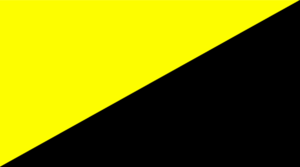Still working to recover. Please don't edit quite yet.
Anarcho-Capitalism
| |
Echo of Freedom, Radical Podcast has a podcast related to this aticle Ownership of Self |
EoF |
Anarcho-capitalism is a capitalist libertarian view that, while believing in personal freedoms, varies from anarcho-socialism on the matter of property rights. Unlike classical Anarchism, Anarcho-Capitalism views the current capitalist system as a symptom of the state, which it defines as a monopoly on force. It emerged in the 1950s out of the tradition of classical liberalism (see libertarianism), and generally sets itself in contrast to classical anarchist theory. Anarcho-Capitalism embraces the free market which contrasts with traditional Anarchisms that have historically been opposed to market relationships. It should be noted that Anarcho-Capitalists define the words "capitalism" and free market differently from classical Anarchists in favour of the Austrian economic definition of the words. This difference in terminology is often the basis for controversy. Murray Rothbard, an Austrian economist influenced by individualist anarchists like Benjamin Tucker and Lysander Spooner, is often thought of as the founder of modern anarcho-capitalism, although anarcho-capitalist themes can be found as far back as Gustave de Molinari and his landmark work, The Production of Security, as well as the works of Frederic Bastiat.
Varying Views on Intellectual Property
While some Anarcho-capitalists support intellectual property, many oppose it, saying that intellectual property infringes on physical property. Jeremy Sapienza, founder anti-state.com writes, "Is there nothing more preposterous than equating intellectual property, whatever the hell that is, with real, personal property?"[1] The debate over intellectual property among Anarcho-capitalists is still on-going.
Wage Labor
Anarcho-capitalists state that an employer-employee relationship is an elaborate and mutually profitable form of voluntary association. They resent government as a parasite that corrupts, biases, impedes and distorts what would otherwise be peaceful fair and free associations.
Anarcho-capitalists consider that in consenting to a contract, that each party was free to refuse, the contract is voluntary and therefore legitimate and beneficial, claiming any external power that attempts to prevent such relationship is itself an oppression to be fought.
Anarcho-capitalists argue that, no matter what social organization may or may not exist, social organizations will never eliminate the basic human requirement to work in order to support themselves. Therefore an objection based on a constraint that cannot be overcome is useless to argue about and not a rational objection at all. Additionally, they argue that while someone may not be able to refuse to work in general, one has the largest diversity on the free market with regard to their employers or beginning their own business operation. What matters is that no given employer/employee contract be coercive. Thus, Anarcho-capitalists believe that an individual may choose to work in any manner they wish, be it for a wage or for some other means of payment, so long as there is no coercion involved.
Classical Anarchist Criticism of the Concept of Anarcho-capitalism
Anarcho-capitalism is a view that is diametrically opposed to Anarchist theory in that it regards only the state as unnecessary and harmful to human society and preserves the hierarchy and authoritarianism of the capitalist/"free" market business model. In its embrace of capitalist economics, Anarcho-capitalism contradicts classical anarchism, which historically and currently has been anti-capitalist. Social anarchists generally argue that anarcho-capitalism isn't a form of anarchism at all, as it differs on what constitutes illegitimate hierarchy, often denying a central basis of classical anarchist theory that advocates the abolition of all hierarchy. Anarchists generally believe that capitalism cannot exist without enforcement of an economic class system, thus it is impossible to remove coercive hierarchical relationships from a capitalist system.
